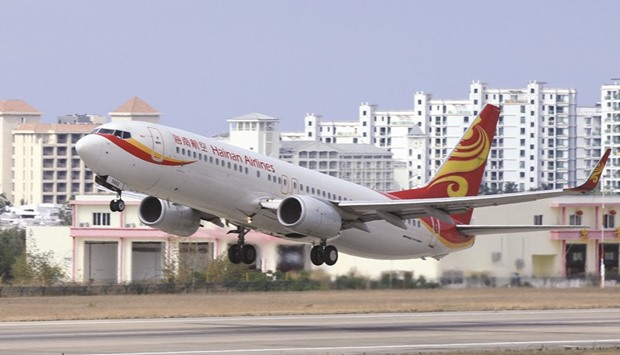After a spending spree stretching from hotels to electronics distribution in 2016, Chinese conglomerate HNA Group says it is now investing in financial services, betting on asset managers and consumer finance for growth at home and overseas.
The owner of Hainan Airlines Co inked about $20bn in deals last year, snapping up a stake in Hilton Hotels and investing in catering and logistics firms – spending that raised concerns the group was borrowing too heavily and spreading itself too thinly.
With more than $100bn in assets, investments this year have included a hedge fund platform, a New Zealand lender and a 3% stake in Deutsche Bank.
The moves reflect a broader push by China into financial services globally as Beijing encourages its corporate sector to expand overseas, although they face increased regulatory scrutiny in the United States and Europe.
More than a dozen Chinese firms – not all with financial background – are scouting for financial sector targets from Portugal to New York, the Asia head of financial sector M&A with a European bank in Hong Kong said.
HNA is among those leading the charge.
“We know the demand for wealth management is going to be very strong,” Guang Yang, the chief investment officer of HNA Capital, the group’s financial arm, told Reuters.
“We have a very large customer base, frequent flyers and people staying in our hotels,” he said, a readymade client list.
A person familiar with HNA strategy said the group saw financial services – particularly asset management – as a natural extension of its aviation and logistics businesses: first it moved people, then freight and now cash.
“As the Chinese are getting wealthier and their demand for investment opportunities grows, the ability to manage assets on a global basis will (be important and) a good business to get into early,” this person said, declining to be identified in the absence of permission to talk to the media.
China’s domestic asset management industry has ballooned in recent years, with the country’s 108 fund managers, 12 qualified securities firms and one qualified insurer overseeing mutual fund assets alone worth 9.2tn yuan ($1.34tn) at the end of 2016, according to the Asset Management Association of China.
Financial services produced almost a fifth of group operating revenue and more than a quarter of gross profit in 2015, an HNA Group bond prospectus showed in September.
The unlisted group does not publish up-to-date financial figures.
The prospectus showed long-term borrowing had increased more than 40% from a year earlier to $28.25bn.
In HNA’s latest deals, it bought a large stake in hedge fund platform SkyBridge Capital from Anthony Scaramucci, a high profile supporter of US President Donald Trump and spent $460mn on New Zealand’s largest non-bank lender UDC Finance.
Two people with knowledge of the matter said HNA is bidding for UK-listed insurer Old Mutual’s $900mn controlling stake in its US asset management business.
HNA declined to comment.
Both SkyBridge and UDC Finance, which mainly provides car loans and equipment finance, offer stable revenue, while allowing HNA to increase yields by borrowing in the institutional market and lending in the retail market.
The Auckland-based company also boasts a management system that HNA could potentially utilise in China, where consumer finance is blossoming from a low base.
Still HNA’s rapid expansion has prompted concerns it is spreading itself too thinly.
“The real risk for HNA is a loss of strategic focus,” said Brock Silvers, founder and managing director of Kaiyuan Capital, a Shanghai-based investment advisory firm.
“Their plan to build a financial empire takes a lot of human capital, resources and time.”
Carol Yuan, an analyst with Aberdeen Asset Management, said she was concerned with HNA’s debt, which can sit anywhere in the group financial structure and can be issued by any part of the group.
“It’s hard to get comfortable around how they manage risks,” Yuan said.

A Hainan Airlines plane takes off from the Sanya Phoenix International Airport. Chinese conglomerate HNA Group, the owner of Hainan Airlines, inked about $20bn in deals last year, snapping up a stake in Hilton Hotels and investing in catering and logistics firms u2013 spending that raised concerns the group was borrowing too heavily and spreading itself too thinly.
